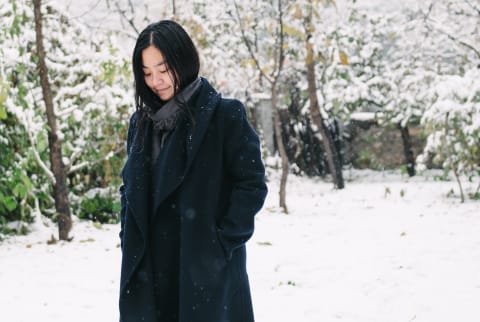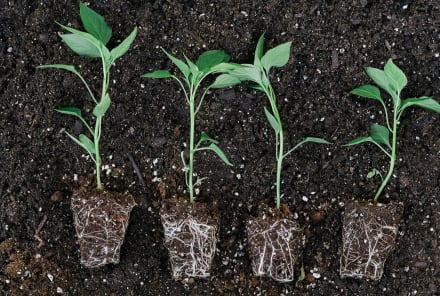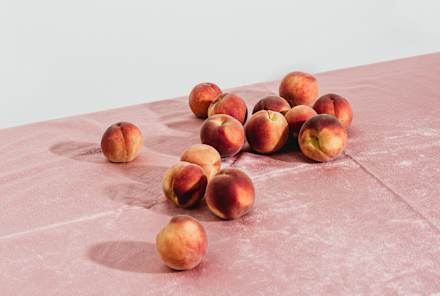Advertisement
The Nature-Inspired Philosophy That Helped Me Get Through Postpartum


I've spent the last decade devoting myself to cyclical and seasonal living. In a nutshell: I've embraced the ebbs and flows of my natural energy as they align to the cycles and seasons of the natural world around me.
Throughout the cycle of the moon (waxing to full and waning to new), for example, I feel into my "inner moon" that leaves me more energetic and social some days, and more inward and relaxed on others. And with the way seasons are where I live, I allow myself to feel more tired in the winter when the sun sets in the sky earlier and more vibrant and outgoing when spring comes and the flowers bloom and the garden begins to grow.
As I've embraced a seasonal and cyclical way of living, I've been confronted with the beliefs I was raised with: that I should treat my body and my energy like a machine. Under the system of capitalism (also known as hustle culture), we are expected to work 9 to 5 all year round—even when the sun is going down early and we feel tired in our bones during the winter. Even when the mornings are warm and our bodies just want to be outside picking fruit and napping under trees instead of sitting in a fluorescent-lit, air-conditioned room during the summer.
Hustle culture wants us to believe that life is static and linear, unemotional, and definitely not cyclical. But our bodies know that is not true, and it never has been.
The timeless value of cyclical living.
Most of our ancestors have hunter-gatherer pasts, and they relied on tracking the natural world for survival. Threads of this can be found in the traditional naming of the full moons. For instance, October's full moon is commonly referred to as the Hunter moon, which refers to the part of the year in North America when the harvest is gathered, the frost is coming, and it's time to hunt the last of the game to store for the long winter ahead.
There is also the Milk Moon of late May, which is associated with the return of certain weeds, herbs, and grasses. When they returned, so would the sheep, goats, and cows looking to fill their bellies with nourishing greens after a long, hard winter. In turn, they would produce the milk to feed their young and the grateful bellies of our ancestors.
In modern times, we have grocery stores and farmers markets to ensure our survival through the long winter. But I believe these seasonal instincts I'm referring to are still alive in us today.
Living a seasonal and cyclical way of life has helped me to work with the energy of the season in partnership with my body, instead of going against it.
For example, spring is traditionally for planting seeds for the coming year's crop of food, so I intentionally focus on beginning projects and moving things forward. Summer is traditionally a season to pause and play as the sun shines high overhead, so I make sure to do just that. Autumn is traditionally for the harvest, so I intentionally focus on bringing my projects to completion and reflecting on how they went and how they felt for me. And finally, winter is traditionally a time for deep rest and dreaming—when the crops have been brought in, the frost has arrived, and the sky is dark. So I focus on just that...even in January, when all the hustle and bustle with resolutions is happening.
Earlier this past May, however, I had an experience where I felt the onset of an internal winter. My feelings and my body's needs didn't line up with the bright hope of spring and playfulness of summer.
Into the cold depths of my internal winter.
At the time, I was six months postpartum after the birth of my first child—an experience that walloped me in ways I could not have predicted. Breastfeeding, sleep deprivation, the grief of losing my old life, feeling isolated during the pandemic, and a massive shift to my identity put me in a place of needing to go inward to process and heal. I had so little energy to give and was veering toward postpartum depression.
I tried to force "spring" in my body and life because I felt like I "should be back to normal by now." I tried. I really did. But it was simply true that I wasn't ready to emerge from my cocoon. In fact, I had to turn around and crawl back inside.
So I consciously chose to let myself be immersed in my internal winter. I released myself from any responsibilities that weren't absolutely vital. This meant dropping any appointments, phone calls, meetings, or obligations that weren't absolutely imperative. It meant disappointing people and potentially looking flaky, but it freed up a lot of space in my calendar and in my brain.
I made it known publicly (through a vacation responder on my email and with posts on my social media) that I was going back into my cocoon and needed to step away from all unnecessary spaces for a while. I established very strong energetic boundaries around my little winter cocoon. This meant I was very clear with how I spoke to myself and others about my needs during this time. I had to fully commit to this being the best thing for me and my family. Once that was clear, everyone around me could feel it, too.
I reached out to beloved friends, letting them know what was happening for me. I told them I'd likely be less available but still very much wanted to be connected and supported if they had space for that. I created space in my days for whatever was needed for me to care for myself. This still included doing dishes, feeding and diapering my child, and taking care of the important particulars of life. But it left space for a nap or a shower or staring at the wall while drinking a glass of water.
I cried a lot. When you make the space you so desperately need but haven't been giving yourself, the feelings come. I talked to my therapist. I asked my husband to hug me. I spoke to my friends over long rambly text messages. I let myself be held in deep and important ways.
Eventually, I emerged having learned a valuable lesson.
It took longer than I thought it would. It turns out, it's really scary to admit how much space we actually need when these inner winters come into our lives, so it's OK to say you only need a week and actually take a couple of months.
I'm back out in the world now with a sense of springtime-in-the-fall. But I know that winter is coming to my corner of the world, and I look forward to putting my sweatpants on and a scrunchie back in my hair and cuddling on the couch with my journal. Because I know that wintering is in service to true and deep nourishment. I give you permission to try it, too.











